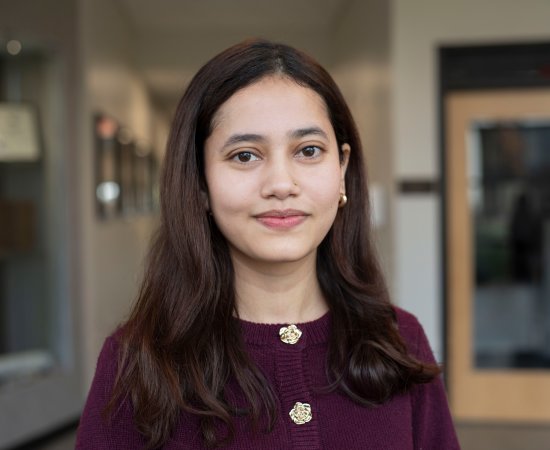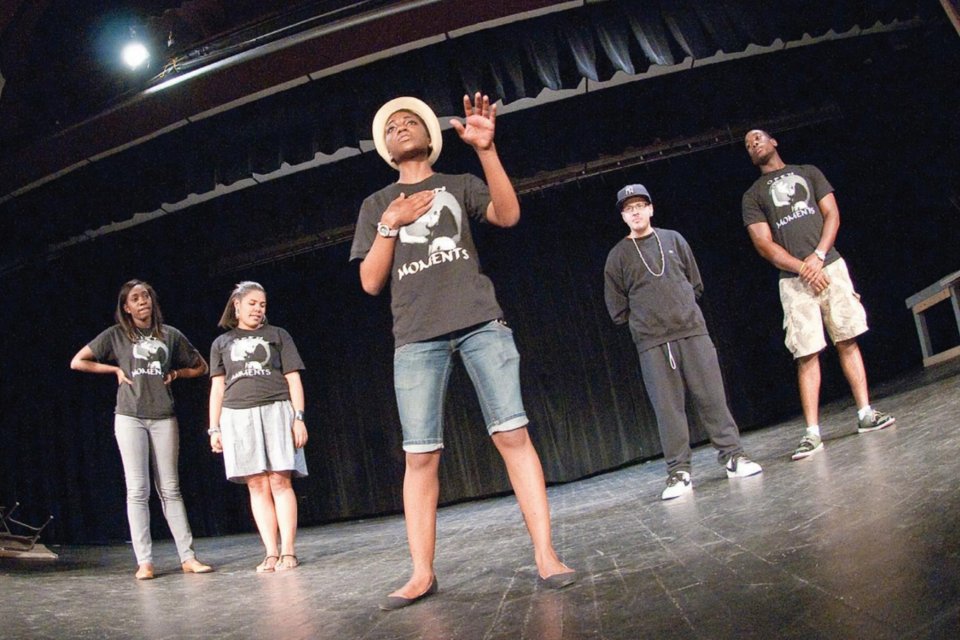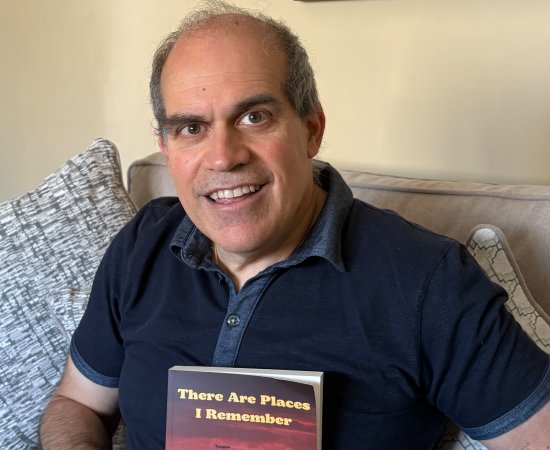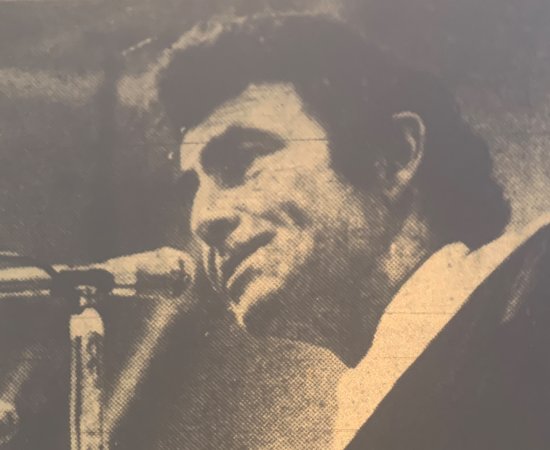
Live Poet Society

Founded by freshmen, UC's new poetry club, Open Moments, delivers dynamic creativity with a social conscience.
Sometimes it begins with a joke, or the frustration of being unable to catch a cab on a city street late at night. It might spring from a passing thought or a deeply held belief.
For the members of Open Moments, a student poetry club founded at UC in the Fall of 2008, anything can become a poem. Every facet of life is raw material and every performance an opportunity to bring the power of their experience-driven art to a new audience.
Performance is an important part of what Open Moments does, but the group also focuses on the process of writing poetry. The pieces they perform are all original compositions - a fact that has deeply impressed more than one audience over the past year, including attendees at a May 2009 Board of Trustees dinner that featured an Open Moments performance.
"They were just shocked," group co-founder and president Keron Alleyne '12 recalls. "Some didn't know that the poems were our original pieces. They were amazed something like this was happening at the College."
Another point of amazement: all of the Open Moments performers at the Trustee dinner were freshmen.
Established by Alleyne and three other first-year students - Sam Maldonado '12, Tiffany Williams '12, and Jamilia Cain '12, Open Moment was predominately made up of freshmen in its inaugural year. Not all of the participants had written or performed poetry prior to their membership in the group. Maldonado, one of the club's most accomplished performers, began his poet's journey in October of 2008, after a random encounter with Alleyne at their residence hall.
"Keron and I both lived in North Hall," Maldonado recalls. "He was coming into the building and I was coming out. I had a pen and a note pad, and I guess I was curious, so he asked me, 'Hey, do you write poetry?' I told him no, just music, and Keron said 'Well, that's good enough - it's still a writing art.' And I was like, yeah. We started talking after that."
Williams' first encounter with Alleyne was similarly random. "I had seen Keron on campus," she says. "One time I was sitting int he lounge of North Hall writing and he said, 'Oh my god, you write, too?' And I said, yeah. So he started to tell me about how he wanted to start Open Moments. From there we kind of lifted off."
It was, in fact, a relatively off-hand suggestion by Cain that got the idea of a club started.
"One day I noticed Keron was writing poetry, and I said, 'Hey, we both write poetry. Why don't we start an organization?' At the time, we didn't know whether or not there was already a poetry club at the College. It just seemed like it would be something really big for UC," says Cain.
Being heard
Though poetry was new to Maldonado, he did have some experience writing songs for R& B singers. He was not, however, a performer himself when he started working with Alleyne. One of his first public poetry readings took place at an open mic event hosted by UC's Latin American Student Union (LASU). "I was pretty nervous," says Maldonado. "The paper was shaking in my hand."
In spite of the nervousness, though, Maldonado felt strongly about delivering the poem. "It was a piece about racism," he explains. "It was like a true story poem. Once I was in the dining commons and noticed that the white kids were sitting on one side and the black and Latino kids were on the other. It was just irritating me - I was thinking, why can't everyone just sit together? So I decided I should write a poem about it, and that's what I read at the LASU event."
"It's kind of cool, because the day after I read it, I saw some kids kind of mingling with others in the dining hall. I guess the people that were actually listening had switched their seats. That's why I feel if I can touch one person with my poetry, I know I've made a difference," he says.
Alleyne, Maldonado, Cain, and Williams started building Open Moments from the ground up at the start of the 20008-09 semester. They settled on the name as a way of paying tribute to a friend's late sister. "She and her boyfriend had started a poetry club called Open Moments at Baruch College, and we named our group in homage to her," says Maldonado, though for him, the name carries layers of meaning. "Open Moments is a way of saying you have to be ready for whenever your moment comes. Also, the initials O.M. are like a mantra. Poetry is kind of like a meditation."
First on the agenda was approaching the Student Senate for recognition as a club. They saw this as more a performance opportunity than an interview. "We didn't just want to go in there and tell them what the club was about," Cain says. "We wanted to show them."
"Together we created a poem that had all four of us talking about the positions of president, secretary, treasurer, and so on," says Maldonado, "and we performed it at the senate meeting."
Alleyne counts this among his favorite performances. "I said something like: I'm the president like Bush, but more like Obama; because I bring change and a little less drama. Everyone was just stunned. it was so small, yet big at the same time," he says.
Their first public performance as an official UC club was at the LASU talent show in November 2008. Alleyne says the piece they performed began with a poem he was working on that compared relationships with basketball and featured the refrain, "pass the ball." Williams, Cain and Maldonado had written pieces as well, and then together they crafted a kind of poetic conversation about relationships, each playing a role.
“The final piece went through different scenarios, from abuse, to relationships in general, to how guys and girls feel about one another, to raising awareness about STDs,” Williams says. “It all just flowed together as one piece. We hadn’t planned it that way. It ended up making total sense.” “It was powerful,” says Alleyne. “The audience was
kind of stunned. When we finished, a lot of people were still thinking about what they’d heard. Then they started to applaud.”
Writing and Listening
Open Moments began recruiting new members at campus events, turning up for open mike nights, listening to performers, and approaching them afterward to tell them about the club. Before long, they had 20 members, and the group began meeting in the basement of North Hall each Thursday at 10:30 p.m. to work on their craft.
Experience wasn’t a prerequisite. In fact, from the beginning, the group was about developing as an artist. “Some of us write,” Alleyne says. “Some of us listen. Eventually the listeners become writers. After a while of being in the group, people realize that everyone can write because everyone has a story.”
Much of the focus of these meetings is on writing, and the group’s organizers use different strategies to spark inspiration. “We always do a quote of the day, so members can take it with them,” says Maldonado. “It might inspire them, it might change them, no one knows. We’ll put topics down on pieces of paper, throw them in a bag, shake them up, and whatever topic we draw out, we’ll ask the members to write a poem about it. One week it was breast cancer, and everyone wrote a poem, then came back the next week and read it.”
Meetings also include open mic sessions that give members the opportunity to work on their stage skills and receive constructive feedback from their peers. It’s a comfortable, workshop-like atmosphere in which to develop as an artist. Sometimes, though, when a major event is nigh, Alleyne has been known to apply a bit more pressure on his charges.
“When we did the AIM Extravaganza, I took everyone outside that was in that performance, and if we couldn’t get the poem right, we couldn’t go back inside,” says Alleyne. “It was cold, it was raining, and all we had on was tee-shirts and shorts and slippers. That helped a lot. It really did.”
Cain laughs when asked about this. “It was like that Denzel Washington movie The Great Debaters,” she says.
As they became increasingly confident about their ability to connect with an audience, Open Moments organized more and more ambitious performances, leading up to a major event in March 2008 called “Poet’s Paradise,” which was dedicated to Williams’ late mother. “It was held on my mom’s birthday,” says Williams. “Poet’s Paradise was a chance to introduce the College to Open Moments – like saying, we’re stepping out and we’re not afraid.”
Cain remembers it as a kind of milestone for the group. “It was our first really big show, and we had people come to UC from other schools and from New York to perform,” she says. “It was really good, because it actually showed how big we had become as a club.
We had started with just a few people, and at Poet’s Paradise we had so many people performing poetry. That was really huge for us.”
That yellow taxi cab
Boys and Girls High School presents a somewhat imposing brick edifice just across from Fulton Park in Brooklyn. When he was a student there, Keron Alleyne would take the A Train every morning from his family’s home in East New York to the stop on Utica Avenue. Alleyne laughs at the coincidence of the street name, suggesting a deeper significance. “I was destined to come to Utica College,” he quips.
When he speaks about his craft, though, he does indeed seem destined for great things, if only by virtue of his sheer determination to make those things happen.
The urban landscapes Alleyne inhabits occasionally provide the context for his work and sometimes the inspiration. He recalls one Manhattan evening, after a performance by members of Open Moments at the Nuyorican poets café, when he tried to hail a cab for two of his fellow poets. “I stood in the middle of the street, waving my Macy’s bag, and they all just kept speeding past. Then one stopped and sped around me. That was the last straw,” he says.
Alleyne ran after the cab for two blocks and caught it at a light, then talked the driver into taking his companions home. He later joked that the incident should be turned into a poem, then – as so often happens with his muse – the joke became the poem…
I’m so mad at that yellow taxi cab
I stood in the street waving my Macy’s bag as he drove
past full force flooring the gas.
Not once did he stop as my jaw dropped in awe and
amazement
because just by doing what he did he made a statement.
A statement saying because you look like this, and it
being dark outside
you can’t get a ride.
My blood boiled inside!
The American-born son of Trinidadian immigrants, Alleyne credits his mother with facilitating his discovery of literature in general and poetry in particular. “My mother brought home a lot of books when we were younger,” he recalls. “That’s when I discovered Langston Hughes was my favorite author. I didn’t even know it was poetry at the time.”
He has other favorites as well, such as Amir Sulaiman, the Muslim poet and hip hop artist. Alleyne has been compared to Sulaiman, and has met award-winning poet, educator, and performer Mo Beasley, who teaches at Medgar Evers College. Beasley was working with poetry students at a Brooklyn high school at the time, and Alleyne – on the elder poet’s recommendation – began reading with the classes twice a week.
“Some of them don’t believe I’m 19,” he says, smiling. “When I read, they are in complete and utter shock.” Clearly this is a man who enjoys shocking people nearly as much as he enjoys writing and performing.
Urban life as poetry
Another Brooklyn native, Jamilia Cain, was shy about her writing growing up. “I first got into writing poetry when I took a creative writing class in ninth grade,” says Cain. “The first poem I remember writing was called ‘Black Beauty’. At first my class didn’t believe I had written it, but then they saw me keep writing and reading my poems in class.”
Performing is something that has always been a part of her life, Cain says, since taking ballet as a young girl. Speaking in front of an audience, however, was a big hurdle for her. Prior to her time with Open Moments, she had recited her poetry in class but never actually performed a piece in front of patrons at a public event. Fortunately, Cain had a strategy for dealing with this – one she shared with some of the less confident members of the club.
“I’m not the type of person who can just write poetry down and remember it,” Cain explains. “I’m the type who has to think of a poem first, and I just keep reciting in my head, and that’s the way I learn how to memorize it. I won’t say that I taught other members of the group that technique, but I think I may have inspired them to work that way by example.”
Cain has spent her summer at home working long hours in retail, but this hasn’t stopped her from writing. “I’ll never stop,” she says confidently.
Neither, it seems, will Tiffany Williams. She is from Harlem, but spent the first six years of her life with her extended family in Jamaica. “I was born here, but like a lot of Jamaican parents, my mom sent me there to get better schooling and more discipline,” she says, describing a strict-sounding early childhood education regime wherein beatings for infractions like tardiness were not uncommon.
“In Jamaica, there was no time for fooling around until you were out of school and with your friends. So when I came back to New York, I thought, this is definitely a different culture,” says Williams, laughing.
Williams came to writing a bit differently than Alleyne did. Her mother used to make her write as a punishment. “It didn’t work very well,” she says, “and writing ended up being kind of a free-time thing for me.”
When her mother passed away, Williams, then just 12, began applying her nascent talent in a different direction.
“I started to write a lot more – that was my way of venting,” says Williams. “That helped me get refocused. And when I got to UC and met Keron, I thought, oh, this is it. This is exactly what I need.”
Over the summer, Williams spent a lot of time with her godmother, a teacher she and her mother had known through their church and someone who remains a source of inspiration. “We’ve been talking about how important it is for a young girl to have a father in her life. In my neighborhood, you don’t see too many family pictures with both the father and the mother – it’s usually just the mother. I’ve written six poems about that this summer,” she says.
Big shoes to fill
Maldonado, too, spent the summer break in pursuit of poetry. In August he took part in an open air performance near Shea Stadium in Queens organized by the Latino poetry group El Grito de Poetas. Maldonado read a composition he titled “Mutation”, delivering each newly-crafted verse like it was written in his D.N.A….
I am an unlikely creature
So rare that I should be placed in the same category as
unicorn
I’m like nothing you’ve ever seen
I’m so X-men, wolverine, cyclops or even storm
I’m like nothing you ever seen before
I am the true meaning of that one guy left out of the circle
Yes, I’m an outsider
I am an extraterrestrial alien to this universe
I am an immigrant to these people
Now I can say that I am a Mutant
“El Grito de Poetas have really been helping me out, giving me tips. One of them has taught me the history of poets that came before us in my heritage. There are many Puerto Rican poets who are very well known,” he says. “He was showing me that I have some really big shoes to fill.”
One of Maldonado’s favorite poets is Jesús Papoleto Meléndez, whose work “Message to Urban Sightseers” the young Bronx native very much appreciates. “In the poem, he’s telling a tourist to stop looking up at the big skyscrapers and start looking at how people are living on the street. It’s very creative.”
Maldonado’s own work frequently opens with familiar imagery, like the pleasures of summer in the city, but then draws the listener into far weightier subject matter. A topic he often returns to is domestic violence, something he’s witnessed in his neighborhood and written about with great passion. This summer Maldonado performed a domestic violence poem at a “Goodbye to Violence” party held by the Boys and Girls Club of New York. He plans to work with the Womyn’s Resource Center at UC when he returns to campus.
History is another source of inspiration for Maldonado. He is currently working on a piece about the “Trail of Tears”, the forced transfer of the Cherokee nation from western Georgia to Oklahoma in 1838, taking pains to research that moment in history so that knowledge will inform his creativity.
“I used to try to write my poems as fast as I can, but now I don’t need to,” he says. “If you take your time and focus, it will come out better.”
When the opportunity presents itself, Alleyne and Maldonado will meet up in the New York area for a workshop or open mic. They joined forces at a poetry class in the Bronx this summer. The journey from Brooklyn took Alleyne two hours, but there were no regrets. “Keron and I always connect when it comes to poetry,” says Maldonado. “We will go anywhere to perform.”
Following their muse
Often a central challenge of campus organizations is sustaining enthusiasm from year to year. Open Moments, however, appears to be meeting this challenge, thanks in part to the youth of its core membership but also to the shared spirit of creativity that propels them forward together.
“We knew what we came together for, and we just stuck with it,” says Cain. “The reason why we lasted longer than a semester is that we are all able to express our feelings through words, and those words help us stick together. We’re just able to have that brotherhood and sisterhood, just being there for one another.”
Williams ascribes much of the credit for their success to Alleyne. “Keron’s a really good leader,” she says. “He cares about us all.”
For his own part, Alleyne is very much looking forward to the new academic year and the promise it holds.
“This time around,” he warns with a smile, “we’re coming back and we’re coming back strong.”
More Stories


The Places He Remembers - Mike DiLeo '89

Pioneer Past: Utica gets a visit from The Twilight Zone
I would like to see logins and resources for:
For a general list of frequently used logins, you can also visit our logins page.
